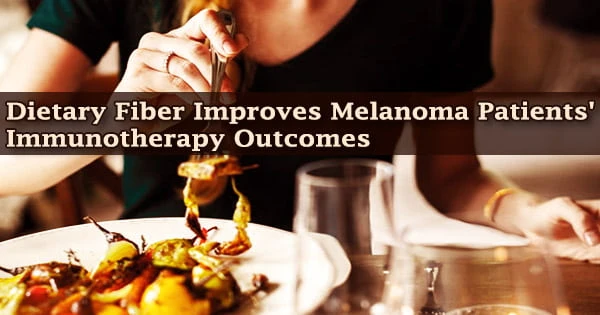According to a major, multinational study collaboration that includes the Oregon State University College of Pharmacy, melanoma patients undergoing medication that makes it simpler for their immune system to attack cancer cells respond to treatment better when their diet is high in fiber.
The study, sponsored by the University of Texas and the National Institutes of Health, was published today in Science and represents a promising advance in the fight against various types of cancer, including melanoma, the most fatal form of skin cancer, according to the researchers.
Melanoma is the fifth most frequent malignancy in the United States. According to the American Cancer Society, over 100,000 new melanoma cases will be diagnosed in the United States this year, with over 7,000 of those individuals predicted to die.
Melanoma is one of the most aggressive tumors, and it kills people by spreading to other organs like the liver, lungs, and brain.
The new research focuses on an immunotherapy strategy known as immune checkpoint blockade, or ICB, which has changed the treatment of melanoma and cancer in general.
Inhibitor medications are used in ICB therapy to block proteins termed checkpoints, which are produced by specific immune system cells, such as T cells, as well as some cancer cells.
We showed that dietary fiber and probiotic use, both known to impact the gut microbiome, are associated with differing ICB outcomes. From the human cohort results we can’t assign causality there may have been other things going on with those patients that we didn’t measure in this study.
Morgun
Checkpoints help restrain immune responses from becoming overly aggressive, but they can also inhibit T cells from destroying cancer cells. As a result, when checkpoints are inhibited, T cells are better able to attack cancer cells.
“ICB has been a game-changer in cancer therapy, and the influence of the gut microbiome on therapeutic response has been demonstrated in numerous studies, in preclinical models, and also in research involving human cohorts,” Morgun said.
“A person’s microbiome is shaped by a wide range of environmental factors including food and medications, while human genetics accounts for a much smaller proportion of the microbiome variation from person to person.”
The human gut microbiome is a complex ecosystem made up of about 10 trillion microbial cells belonging to over 1,000 different bacterial species. According to Morgun, it’s still unknown whether dietary fiber intake and the usage of commercially available probiotics improve cancer patients’ immunotherapy response.
Morgun and his colleagues examined hundreds of melanoma patients, examining their gut microbiomes, dietary patterns, probiotic use, disease characteristics, and treatment outcomes. Anti-programmed cell death protein therapy, also known as anti-PD-1 therapy, was used to treat the majority of the patients.
A parallel study involving mice implanted with tumors was also part of the research.
Higher dietary fiber intake was linked with illness non-progression among patients on ICB in the human observational cohort phase of the trial; the most pronounced benefits were reported in patients with high dietary fiber intake but no probiotic usage.
The mouse model generated similar results.
“We showed that dietary fiber and probiotic use, both known to impact the gut microbiome, are associated with differing ICB outcomes,” Morgun said. “From the human cohort results we can’t assign causality there may have been other things going on with those patients that we didn’t measure in this study.”
The results in mice, however, corroborate the hypothesis that a high-fiber diet with no probiotics boosts anti-tumor immunity the most, according to Morgun.
Morgun and Natalia Shulzhenko of Oregon State University’s Carlson College of Veterinary Medicine devised a computer modeling technique called transkingdom network analysis to assist make sense of microbiome complexity.
The model employed in this study incorporates a variety of “omics” data, such as metagenomic, metabolomic, lipidomic, and proteomic data, to determine how interactions among different types of gut microorganisms aid or impede biological functions in the host. The microbial interactions in this situation involved the host’s response to immune checkpoint blockage.
It’s worth noting, according to Morgun, that transkingdom network analysis in mice revealed that a family of bacteria called Ruminococcaceae was among the organisms that were increased by a high-fiber diet; the same bacteria were discovered in the current study involving humans and previous, related research with people.
He believes that double-blind, randomized dietary intervention studies will be necessary to determine whether a targeted, doable diet adjustment at the commencement of ICB therapy will improve patient results.
“And though the findings suggest that some commercially available probiotics may be harmful for patients on ICB, more research is needed to determine which probiotics could actually be beneficial,” Morgun said.
Jennifer Wargo, Lorenzo Cohen, and Carrie Daniel of the University of Texas, as well as Giorgio Trinchieri of the National Institutes of Health, led the study. A total of 80 scientists were involved in the study; Funders included the NIH and the U.S. Department of State.





